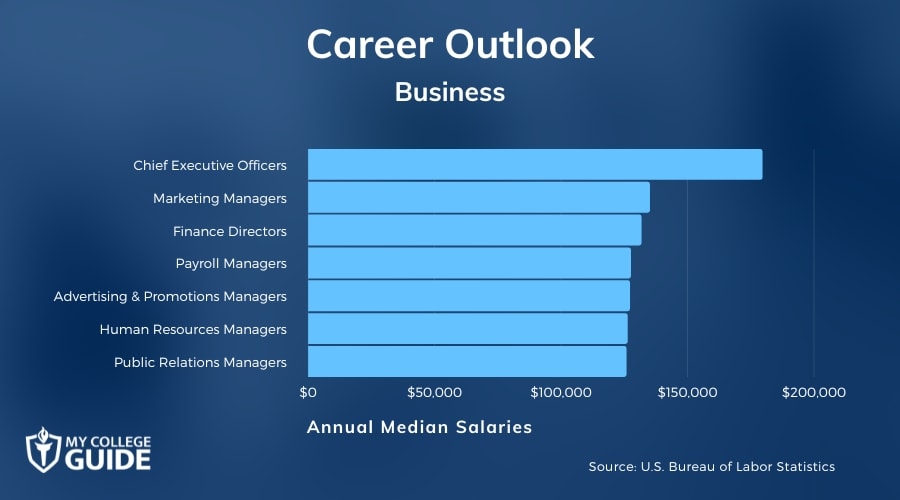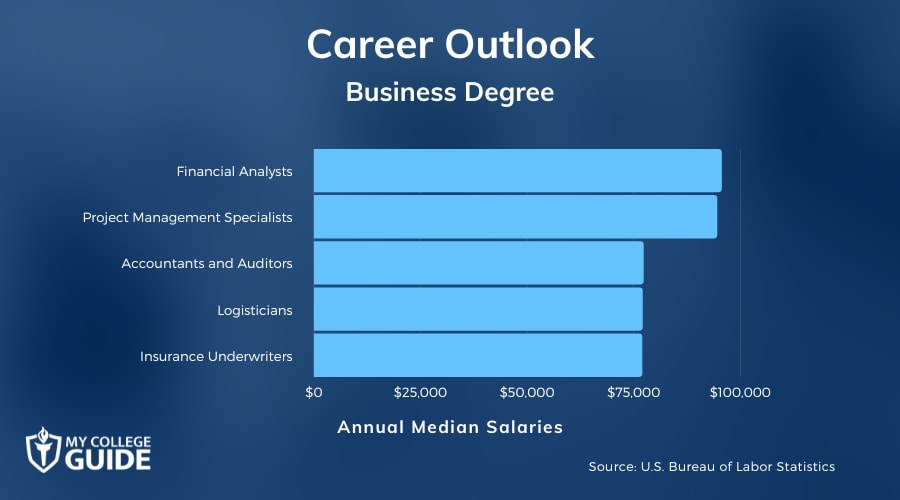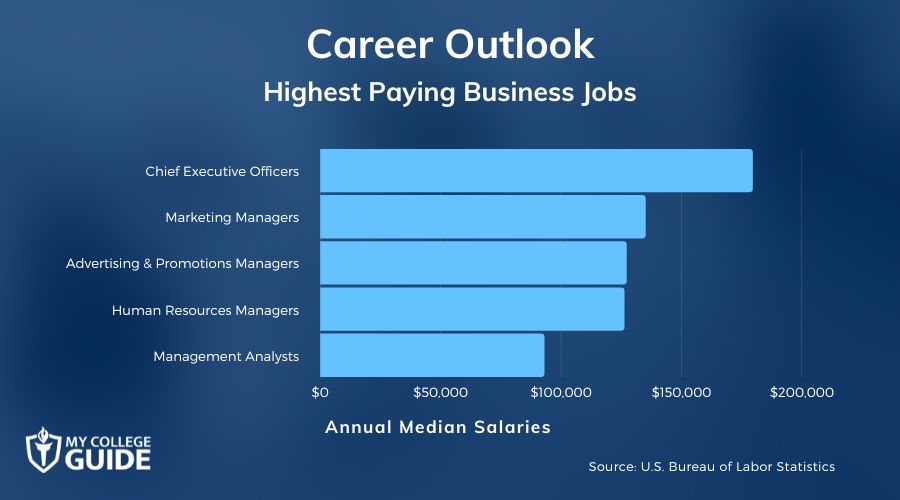From finance and real estate to human resources and entrepreneurship, there are hundreds of business careers to choose from.

Editorial Listing ShortCode:
Let’s explore career fields in business and dive into which are most in demand, the earning potential, what degrees are the easiest to get, and more so that you can decide how to plan for your future in business.
What Can You Do With a Business Degree?

Business is one of the most popular and versatile degrees. Your studies in this field can help you develop in-demand skills like communication, leadership, marketing, and problem-solving.
These foundational abilities transfer across many industries and roles, so business degree holders can pursue a wide range of exciting career paths in business. Many professionals with a business degree find employment in traditional corporate settings. Organizations of all sizes need strong leaders who can collaborate with colleagues, make strategic decisions, and increase profits.
According to the U.S. Bureau of Labor Statistics (BLS), employers who frequently hire business majors include:
- Consulting companies
- Distribution and warehouse providers
- Fashion companies
- Financial institutions
- Healthcare facilities
- Insurance companies
- Investment firms
- Marketing businesses
- Media organizations
- Retailers
- Transportation companies
Because most industries hire business majors, you can seek positions in areas that combine your personal and professional interests. For instance, a job at a bank or credit union could be a great fit if you enjoy crunching numbers in a fast-paced environment.
Editorial Listing ShortCode:
You can also develop expertise in one area of business by completing a concentration during your degree or pursuing additional certifications. Here are some specialized business career paths:
- Accounting
- Business administration
- Business management
- Economics
- Entrepreneurship
- Human resources
- Information systems management
- International Business
- Marketing
- Organizational leadership
- Supply chain management
Each of these specializations can open the door to new job opportunities. For instance, possible careers for a business management degree include client sales manager, management analyst, and project manager.
Popular business administration careers include business consultant and senior business analyst. Some professionals choose to start their own companies after earning a business degree. Entrepreneurship courses can help you develop necessary skills like advertising, budgeting, and negotiating. You’ll also learn how to analyze market trends to offer profitable products and services.
Other potential career paths include working for government agencies, nonprofit organizations, and high schools or colleges that offer business classes.
10 Things You Can Do with a Degree in Business
There are many rewarding and often well-paying types of jobs in the business. According to the Bureau of Labor Statistics, here is a list of careers in business that tend to be popular.
1. Accountants and Auditors

Accountants and auditors help individuals and organizations comply with corporate regulations and tax laws, maintain accurate financial records, and reduce costs.
These professionals can detect fraud and manage risk. They may specialize in several areas, including forensic accounting, government accounting, internal auditing, or public accounting. The U.S. Bureau of Labor Statistics predicts that the demand for accountants and auditors will increase by 6% over the next decade.
2. Compensation, Benefits, and Job Analysis Specialists

Compensation, benefits, and job analysis specialists oversee wage and benefit programs in almost every industry. They ensure that organizations provide competitive compensation packages and adhere to government laws.
These professionals administer supplemental programs like insurance and retirement plans, analyze complex data, and research wage trends. Openings for these specialists are expected to increase by 7% over the next 10 years.
3. Financial Analysts

Financial analysts assess the potential benefits and risks of investments. These experts predict the future performance of bonds, stocks, and portfolios and help corporations and individuals make profitable investments. They also research current and historical economic trends and write reports for clients.
Editorial Listing ShortCode:
The BLS projects that the demand for financial analysts is expected to increase by 9% over the next decade.
4. Financial Managers

Financial managers oversee every aspect of an organization’s financial health, from investments to legal compliance.
They advise top business leaders about crucial financial decisions, identify opportunities to increase profits, and develop strategies to shrink costs. These managers also supervise employees who create budgets and financial reports. Over the next 10 years, the demand for financial managers is projected to grow by 17%.
5. Fundraisers

Fundraisers develop relationships with donors and coordinate in-person and virtual events to raise donations for their organization. These experts ensure that organizations adhere to fundraising laws and conduct research to identify prospective donors.
Fundraisers can solicit donations for various initiatives, such as annual giving campaigns, political campaigns, and university endowments. The Bureau of Labor Statistics anticipates that fundraiser job openings will grow by 11% in the next 10 years.
6. Human Resources Specialists

Human resources specialists ensure that organizations recruit, train, and retain top talent. They help employers write job advertisements, screen applicants, and conduct interviews. They also coordinate onboarding processes and training for new employees.
In some corporations, these specialists may oversee payroll and benefits, enforce company policies, and resolve employee conflicts. Demand for human resources specialists is expected to increase by 8% over the next decade.
7. Insurance Underwriters

Insurance underwriters assess applications for automobile and home insurance, worker’s compensation, and other policies.
They use software to conduct risk analyses to determine if an insurance company should accept an application. These experts also recommend premiums and coverage based on applicant qualifications. This field is projected to experience a slight employment decline of 4% throughout the next 10 years.
8. Market Research Analysts

Market research analysts use data to help businesses create and advertise products and services. They gather information about consumer purchasing habits, competitor sales, marketing trends, and other relevant data.
Analysts use statistical approaches and tools to interpret this information and make recommendations about marketing campaigns. In the next decade, the BLS projects that the employment of marketing research analysts will grow by 19%.
9. Personal Financial Advisors

Personal financial advisors provide clients with financial guidance. They educate clients about estate planning, investments, retirement, and other essential financial decisions.
Advisors often form long-term relationships with their advisees and adjust financial plans as the goals of each client evolve. These professionals also regularly market their services to potential new clients. The demand for personal financial advisors is projected to increase by 15% over the next 10 years.
10. Tax Examiners and Collectors, and Revenue Agents

Tax examiners calculate and collect taxes owed by corporations and individuals. They conduct audits, maintain records, and review tax returns to detect and fix overpayments or underpayments. These experts generally work for federal, state, and local governments.
Editorial Listing ShortCode:
Demand for these specialists is expected to decline by 7% over the next decade, though the BLS predicts that 4,300 new positions will still open annually. These 10 positions are just a small sample of the numerous business management degree careers you can pursue in this wide-ranging field.
Business Careers & Salaries

The best careers in business can earn you high status and a high salary, especially after years of experience. Here is a list of the top 40 business careers & salaries according to the U.S. Bureau of Labor Statistics (BLS).
| Careers | Annual Median Salaries |
| Chief Executive Officers | $179,520 |
| Marketing Managers | $135,030 |
| Finance Directors | $131,710 |
| Payroll Managers | $127,530 |
| Advertising and Promotions Managers | $127,150 |
| Human Resources Managers | $126,230 |
| Public Relations Managers | $125,780 |
| Fundraising Managers | $100,810 |
| Tax Managers | $98,980 |
| Project Management Specialists | $94,500 |
| Portfolio Managers | $94,170 |
| Management Analysts | $93,000 |
| Finance Managers | $92,093 |
| Supply Chain Analysts | $82,360 |
| Financial/Securities/Investments Analysts | $81,410 |
| Auditors | $77,250 |
| Logisticians | $77,030 |
| Insurance Underwriters | $76,390 |
| Purchasing Managers, Buyers, and Purchasing Agents | $75,410 |
| Compensation, Benefits, and Job Analysis Specialists | $64,120 |
| Underwriters | $64,068 |
| Market Research Analysts | $63,920 |
| Business Managers | $63,813 |
| Loan Officers | $63,380 |
| Public Relations Specialists | $62,800 |
| Human Resources Specialists | $62,290 |
| Executive Assistants | $62,060 |
| Training and Development Specialists | $61,570 |
| Property Appraisers and Assessors | $61,340 |
| Fundraisers | $60,660 |
| Account Executives | $60,557 |
| Real Estate Brokers | $60,154 |
| Tax Examiners and Collectors, and Revenue Agents | $56,780 |
| Advertising Sales Agents | $52,340 |
| Payroll and Timekeeping Clerks | $47,610 |
| Bookkeepers | $45,560 |
| Accounts Receivable Specialists | $38,438 |
| Office Secretaries | $37,880 |
| Office Assistants | $37,030 |
| Customer Service Representatives | $36,920 |
| Finance Assistants | $36,005 |
Most graduates from a business program will start in an entry-level position, and through time and hard work, they will be able to work up the corporate ladder.
The business world is booming, thanks to the constant evolution of technology and changing economies. This makes the business career outlook healthy as businesses continue to look for well-rounded, educated employees. According to the BLS, it is projected that careers within the business and financial sector will grow 7% over the next 10 years.
Editorial Listing ShortCode:
In particular, the areas of accounting, finance, and marketing are likely to show impressive growth. However, it’s important to keep in mind that many factors that go into determining salary, and you may make more or less depending on your skill set, experience, and location.
How to Know if a Degree in Business is Right for Me

Most colleges and universities have multiple business degree types to choose from. Oftentimes schools will offer degrees in business administration and business management, with dozens of concentrations available under each of those umbrellas.
Ultimately, the best business degree is the one that suits your own goals, interests, and abilities. Here are some things you should consider when choosing among the best business careers:
- What day-to-day duties are a good fit for you?
- What businesses or companies could you see yourself working for?
- Would you like to travel or work internationally?
- Do you prefer working with people or crunching numbers on your own?
- Are you a leader or more of a team player?
- Are you more interested in collecting data or making predictions based on the data?
- What type of growth opportunities are you looking for?
These are just a few questions to help get you thinking about which business major might be a good fit.
What Is a Business Degree?

A business degree is a degree program that prepares you for the exceptionally broad field of business. Most colleges allow business majors to select a minor or area of concentration. This will help you develop specific skills and stand out from the crowd of applicants in a competitive job market when applying to various types of business jobs.
For example, business majors may choose a minor or concentration in:
- Accounting
- Advertising
- Business management
- Finance
- Human resources
- Information systems management
- Insurance
- Marketing
- Public relations
- Real estate
- Sales
Those are just some examples. Specific offerings will vary by school. For example, some universities may offer real estate degrees online, while others may offer on-campus programs in finance or human resources.
What is a Business Major Good for?

A business degree can expand your career opportunities in corporate environments. While curricula vary among institutions, you can expect to study some of these core topics:
- Accounting
- Advertising
- Business Analytics
- Business ethics
- Change management
- Employment law
- Health information management
- Macroeconomics
- Organizational behavior
- Project management
- Statistics
- Supply chain management
You’ll also gain essential skills you can draw on in any business setting, such as:
- Communication
- Critical thinking
- Financial literacy
- Leadership
- Strategic thinking
The broad knowledge and abilities you’ll gain during your business program can set you up for success in many corporate or entrepreneurial careers.
What Is the Easiest Business Degree?

The easiest business degree depends on your personal strengths. While all business degrees generally cover the same fundamentals and core curriculum while requiring the same number of credit hours, a more specialized degree program may be harder.
For example, a Bachelor of Business Administration with a concentration in finance is much broader, and therefore may be easier, than the more specialized Bachelor of Science in Finance. The BS in Finance will require more demanding courses focused on the practical and technical aspects of finance. It’s important to know your strengths.
Editorial Listing ShortCode:
For example, a career with a heavy focus on finance will require more math courses, so if you are a strong numbers person, this may be a great area for you to specialize in. However, if creativity is your strength, other areas of specialty may suit you better, such as marketing, advertising, or communications careers.
Is Business a Good Career Choice?

Yes, business is a good career choice for many professionals. Business majors have skills that are useful and desirable in any occupation.
Business majors can work in any industry, from the largest theme parks to the local meat packing plant, from a large retail chain to a small non-profit clinic. You can also work in any part of the world. Because business skills are useful in any field, someone with a business degree can most times transition into a new field more easily than someone with a degree in nursing or chemistry, for example.
Advancement opportunities: As with careers in biology, for example, business careers offer a lot of opportunities for career advancement. A degree in business offers a lot in terms of flexibility and career growth.
How Much Can You Make with a Business Degree?

Many careers in business can offer lucrative salaries. According to the Bureau of Labor Statistics, here are the median salaries for 5 business career paths.
- Financial Analysts: $95,570
- Project Management Specialists: $94,500
- Accountants and Auditors: $77,250
- Logisticians: $77,030
- Insurance Underwriters: $76,930
Many factors can impact wages, including education, experience, and location. Your actual salary may differ from these estimates.
What Are the Highest Paying Business Jobs?

When debating what careers can you get with a business degree, it can be helpful to consider earning potential. There are many lucrative business careers. According to the BLS, some of the highest-paying jobs include the following:
- Chief Executive Officers: $179,520
- Marketing Managers: $135,030
- Human Resources Managers: 126,230
- Advertising and Promotions Managers: $127,150
- Management Analysts: $93,000
You could work in the public, private or non-profit sector, and in nearly any industry. There are far more business career ideas than what is listed here. It’s important to keep in mind, you may need additional education or work experience to qualify for some of these jobs.
Look for a program that meets your needs in terms of your goals and interests. With hundreds of quality online business degrees, the sky is the limit. You can fit an excellent education around your existing work and family commitments.
Is a Business Degree Worth It?

Yes, a business degree is worth it for many professionals. You can study a broad array of foundational business concepts and develop transferable skills. This preparation may help you qualify for many satisfying career paths.
Many business programs also allow you to follow your passions by adding a specialization like forensic accounting or organizational leadership. Such concentrations enable you to gain advanced knowledge and may give you a competitive edge for your preferred career path.
Editorial Listing ShortCode:
The Bureau of Labor Statistics projects that the overall demand for business and financial occupations will increase by 7% over the next decade.
Getting Your Business Degree Online

An online business degree could help you start or advance your career in this popular field. Most industries need business-savvy leaders who can build relationships, make informed decisions, and reduce risk.
A business degree can teach you essential skills to help organizations succeed. As the economy digitizes and globalizes, corporations will continue to evolve. As a business major, you can help organizations develop innovative solutions to twenty-first-century problems and provide value to customers.
If you’re ready to continue your educational journey, you can start researching accredited colleges today to find your ideal business program.
